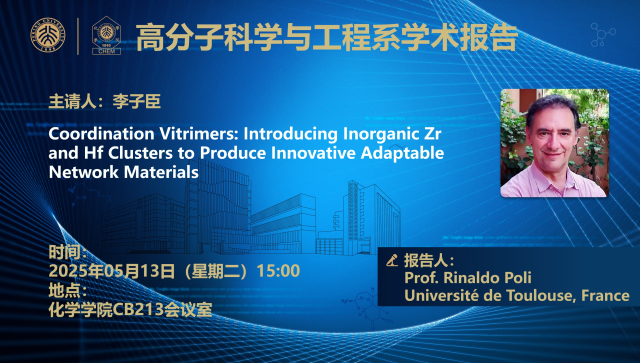
Abstract
The world of polymer materials has acquired a new dimension with the development of adaptable networks, which combine the properties of thermoplastics (better recyclability) and thermosets (better mechanical properties). The key feature is the presence of chemically exchangeable crosslinks, which impart high-temperature plasticity and self-healing properties to the 3-D material. When the exchange process leading to crosslink migration and material reshaping has an associative character, the crosslink density is temperature-independent and an Arrhenius-type rheological behavior is observed, like in vitreous silica, hence the name “vitrimer”. Currently, a flurry of activity within the polymer community aims at developing new vitrimers, all based on the degenerative exchange of covalent organic functions (e.g. transesterification, transamidation, etc.).1 In this lecture, I will show that this area has tremendous opportunities for coordination chemists. I will present new coordination adaptable networks based on the [M6O4(OH)4]2+ (M = Zr, Hf) clusters as crosslinking unit2,3 and on carboxylate ligand exchange as the crosslink migration process. I will also show the results of a mechanistic investigation by combined experimental kinetics (dynamic NMR) and computational modeling (DFT) on a model system, which demonstrates the associative character of the exchange.4 Thus, our developed materials are the first self-healing metallopolymers proven to be coordination vitrimers.
Biography
Rinaldo Poli is Professor Emeritus at INP Toulouse and carries out his research at the CNRS Laboratoire de Chimie de Coordination. Among his most recent distinctions, he was named Chemistry Europe Fellow in 2018, was inducted into the European Academy of Sciences in 2018, and received the Berthelot Medal (French Academy of Sciences) in 2020 and the Achille Le Bel Prize (Société Chimique de France) in 2023. His research covers several aspects of transition metal chemistry: organometallic reaction mechanisms with spin state change, homogeneous catalysis, aqueous biphasic catalysis, metal-mediated radical polymerization, coordination vitrimers.